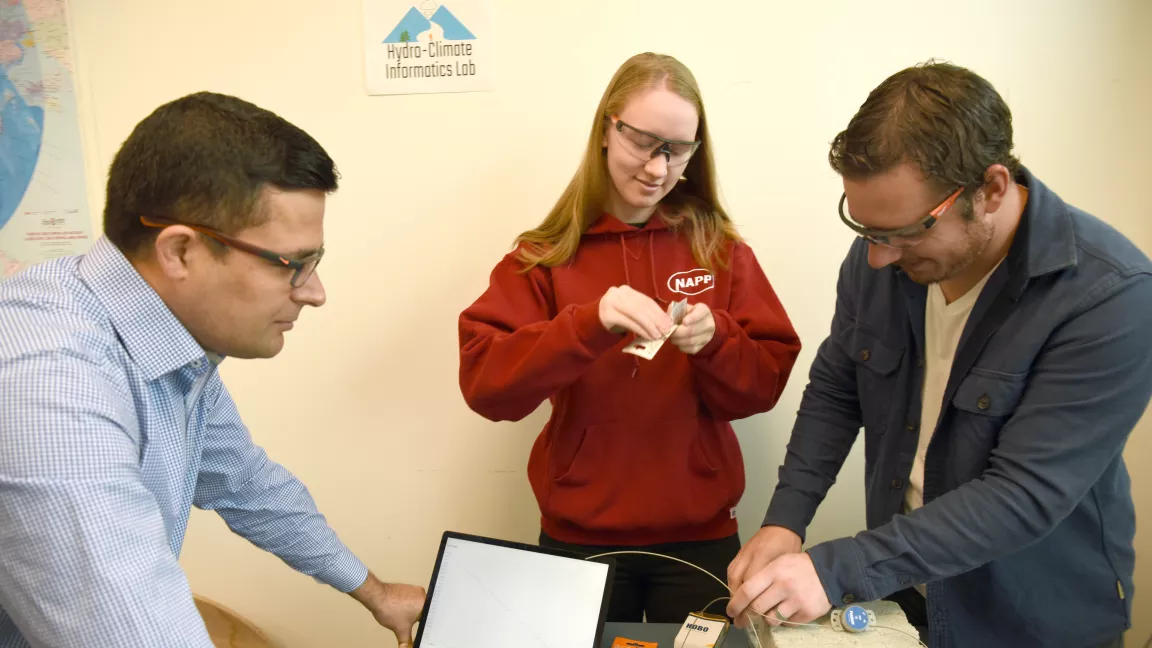Improving hydrological forecasting
Environmental Science Assistant Professor Siraj ul Islam and his research team are developing an improved hydrological forecast system hoped to increase Canada's capacity in reliable river streamflow forecasts. Discovery Grant funding from from the Natural Sciences and Engineering Research Council of Canada will support the five interrelated projects that are part of his research program.

New research underway at UNBC looks to advance the development of hydrological forecast systems and quantify the impacts of climate change and forest disturbances on streamflow and river water temperatures across several watersheds in northern British Columbia.
Department of Geography, Earth and Environmental Sciences Assistant Professor Dr. Siraj ul Islam received $142,500 in Discovery Grant funding from the Natural Sciences and Engineering Research Council of Canada (NSERC) to fund five interrelated projects with the overarching goal of designing an improved hydrological prediction system capable of forecasting streamflow and river water temperatures on daily-to-seasonal time scales with improved accuracy. The project will support two Master’s students and one PhD student at UNBC.
Islam and his research team will use state-of-the-art modeling tools, combined with advanced data assimilation and a forecast initialization method, to develop an efficient hydrological forecast system. This innovative modeling framework will be implemented across several watersheds in northern British Columbia for verification and reliability testing.
“As an early career researcher, the NSERC funding is critical to establish my independent research program. It will enable me to strengthen the foundation of my new research lab, the Hydro-Climate Informatics Lab, and attract motivated highly qualified personnel,” says Islam, who won national accolades for earlier research on seasonal climate forecasting.
He notes many watersheds in the region have experienced significant forest disturbances, primarily due to wildfire and beetle infestations, and says this research will advance the ability to quantify the impacts on regional water resources.
The findings of Islam’s research program will be highly relevant to many stakeholders. He points to the impact late summer and fall river flow conditions have on the way of life for local First Nations communities, dependent on the ability of fish to migrate up-river to spawn.
“The outcomes of this research program will leverage current flood, forestry, and fisheries management practices and will provide new information on skillful hydrological forecasts that are crucial for public safety, infrastructure and aquatic habitats,” he says.
In addition, Islam has partnered with Chu Cho Environmental on a multi-year research project funded through B.C.’s Fish and Wildlife Compensation Program focused on monitoring and modeling river water thermal regimes in the upper Peace River basin. The information and data collected from this project will provide additional resources and support to the development of hydrological forecast system. This project supports two undergraduate students and two Master’s students at UNBC.
Islam says the data collected will be relevant to the hydrological forecast system in the NSERC project. And he says the modeling framework and new methodologies developed in the NSERC project will be transferable to other similar watersheds across the country.
Beyond advancing the development of efficient forecast systems, Islam adds the knowledge base will benefit for years to come, “This research program will train the next generation of highly qualified personnel with advanced computational and hydrological modeling skills and will increase Canada’s capacity in reliable streamflow forecasts and better management of its water resources.”